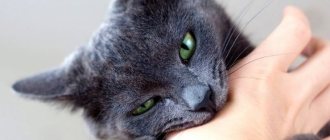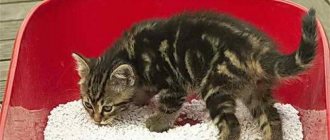Many pet lovers have at least once in their lives encountered a situation where a cat tries to bite while trying to pet their pet. It is necessary to figure out why a cat bites when you pet it right away, since some situations may be justified by the peculiarities of the animal’s upbringing, and some may signal the development of pathologies. In the article, we looked at the behavioral characteristics of cats, the reasons for biting when stroking, and how you can recognize readiness to attack. You will also learn how to stop a cat from biting and avoid possible conflicts.
Features of cat psychology
Before considering the possible causes of biting, we suggest you delve into the facts about the nature of these animals.
Every attentive owner will agree that cats, like people, experience emotions and feelings. Surely you have observed more than once how your pet can fawn and purr, lick its hands and snore peacefully on the lap of its beloved owner. This is how we see the manifestation of love from our pets.
Cats are big fans of a “smooth” approach to their person.
Cats behave especially excitedly at the sight of birds, rodents and other small animals: their pupils dilate, they take a hunter's pose and meow protractedly at their prey. At the sight of a large dog, a cat may rear up, fluffing its tail and backing away - this is how they feel fear and make it clear that they are facing a dangerous competitor. All this is a manifestation of the ancient instinct of cats, indicating that these animals are predators.
IMPORTANT: In the wild felines, biting or nipping is not limited to an act of aggression: it is often the only way these animals can show a strong sense of affection and even love.
An animal’s love of love, even towards each other, often manifests itself through light bites
It is important to understand that a cat is an independent animal that remains an inveterate individualist until the end of its days. Cats do not like encroachment on their personal space; they do not accept forced affection and sudden movements. It may seem that such a small and seemingly cute animal dictates too many categorical conditions, according to which it must be treated strictly according to the rules - this is not so. The conditions are dictated not by the cat, but by its pristine nature, which in the course of evolution has made these animals so attractive and special.
Paying attention to the psychology of cats, we cannot exclude the fact that the manifestation of any emotions in animals is quite limited: a cat cannot say that it loves you, but it may experience such strong delight from your presence that it will try to bite in a fit of feelings without malice. Thus, we can conclude that communication between cats and their owners is a set of common actions that cannot always be taken literally.
What other features of “playful” behavior exist?
In some kittens, scratching as a reaction to stroking is associated with “childhood” - the animal does not yet know how to behave and shows an excess of emotions. The pet tries to show with all his appearance how much he likes the affection and thereby demands continuation.
You can also notice how a cat can purr, but at the same time sharpen its claws. This behavioral reaction may be associated with the animal's gambling. Even adult cats can behave this way! Yes, it's just a fun game for them.
The intensity of scratching and biting depends largely on the nature of the animal itself. There are cats that are only capable of purring, but there are also those that do not even allow themselves to be touched.
For many cats, scratching and biting during petting is also a response, which means that she likes what is happening and she gives her affection in return to her owner.
Norm or pathology
In a healthy state, a cat caresses and then bites for reasons that are determined by their psychology.
IMPORTANT: if a pet easily bites fingers and does not release its claws, this is a sign of trust in its owner.
In normal condition, the pet can allow itself to gently bite the owner's finger
- You may want to pet your cat, but she doesn't always want to. Imposition and violation of boundaries are the most common reasons for this behavior. Often this is how an animal lets you know that it wants to take a break from displays of tenderness.
- It is likely that the cat likes one of the family members the least. Such touches will cause your pet to become impatient, along with an attempt to pull away.
- Cats love children, but not to the point of falling. Children often make noise and are prone to sudden movements. As you know, cats are extremely peaceful creatures. These reasons can cause irritation in the animal, which in turn can lead to a bite when trying to pick up or pet the cat.
- Your pet's character can develop into an exceptional individual. Temperament, habits, habits - all this is not always amenable to re-education.
- The gender of the pet plays a significant role: if the cat is more inclined to independence, then the cat will try to dominate.
IMPORTANT: by defending itself with its front paws, the cat demonstrates in a “civilized” way a request to leave it; real aggression manifests itself when it tries to lie on its back and defend itself with its hind paws - their attack will be the most painful.
Sometimes a bite can signal the development of a serious pathology.
Attacking with the hind legs can be very unpleasant
- Your pet may suffer from pain: back, stomach, head, skin problems and much more. As a rule, when feeling unwell, the animal becomes apathetic, irritable, tries to retire and may lick the disturbing area. The cat will react negatively to touch.
- Gaps in upbringing can also cause conflict behavior in an animal. Up to seven weeks, kittens are accustomed to being stroked by humans - this way they learn socialization and do not show aggression in the future.
- Negative experiences can create an “unsociable” character and mental disorder in an animal. A kitten may face survival in the wild, which is fraught with trauma; adult cats and cats experience fear, pain, resentment and even cruelty. These manifestations hurt the animal’s psyche, forever making it overly cautious in communicating with people.
Pay attention to your pet's well-being
IMPORTANT: alarming signals in your pet’s behavior: lack of sociability, suspicion of deterioration in health, severe aggression when trying to touch a certain place - a reason to consult a veterinarian.
Reasons for aggression in response to stroking
The manifestation of aggression on the part of an animal always has a reason. Of course, it cannot be ruled out that cats also have mental disorders, but such a diagnosis can only be made by a veterinarian and is rare. In most cases, petting aggression in a cat occurs for a specific reason.
Before looking for it, it should be clarified that the concepts of “biting” and “biting” are completely different forms of behavior. Sometimes a pet gently and gently, without scratching or causing obvious discomfort, bites the owner’s hand. This is how a cat usually communicates with kittens, and when your hand becomes the object of biting, this is a sign that the animal loves and trusts you infinitely.
If the cat suddenly begins to attack, scratch and bite hard on areas of the body accessible to him, the reason may be the following:
- Difficult socialization. If a kitten was separated from its mother early, it is afraid of people for a long time and defends itself with bites.
- Character traits. Cats, unlike dogs, are more willful and independent, so they do not always like human contact.
- Pregnancy and lactation. During this period, cats are very vulnerable; they carefully protect their stomachs from any touch.
- Discomfort or pain. If your pet becomes angry when you touch a certain area of the body, it is likely that the area is in pain or injured.
- Display of dominant behavior.
- Excessive attention. Not many breeds can constantly be near a person.
- Negative experience or resentment towards the owner.
It also happens that the animal itself allows you to do whatever you want, licks your hands, and then suddenly shows aggression. Many cat lovers wonder why this happens. In this situation, the reason is the pet’s unfulfilled desire. For example, he starts licking if he wants to be treated to something or caressed, but the person ignores the request. Then the animal tries to get what it wants with the help of bites or simply expresses its dissatisfaction in this way.
Reasons for unexpected aggression
Sometimes a cat calmly accepts affection and stroking, purring without any hint of aggression, but suddenly its behavior changes dramatically, the pet begins to gnaw and attack the hand.
Stroke the cat with smooth and gentle movements
- If your pet falls asleep while stroking, do not change the intensity and strength of movements, this may provoke fright. In addition, poorly socialized animals that tend to be cautious when interacting with people can behave this way.
- Pay attention to the air humidity in the room and the quality of the cat's fur - it should not be too dry; when stroking, microcharges can form, which the pet will immediately feel.
- Giving birth can greatly change a cat's behavior. She will try to protect her offspring, which is also fraught with an attack if someone tries to get close to her or the kittens.
- Resentment can become a reason for unexpected manifestations of aggression. Analyze your relationship with your pet: perhaps you scolded him, did not allow him to play with an object, or punished him by not letting him into the room? Cats are usually not vindictive, but sometimes they can become seriously offended.
What if it's a kitten?
What should you do first if a small kitten constantly bites and scratches? First, contact your veterinarian. Perhaps your baby is worried about teething. The process of changing teeth for kittens is often painful and accompanied by unpleasant sensations. To somehow get rid of the itch, he chews on everything, including the hands and feet of his household members.
Little prankster
If the veterinarian confirms that the aggression is caused by medical reasons, you can calm down - the attacks will soon stop. To alleviate your pet's condition, you need to purchase special toys that he will chew.
If a child attacks a person while trying to play, his behavior must be corrected immediately. Raising a kitten when it bites involves immediately redirecting its attention to toys. You can’t play with your baby with your hands, he will get used to it very quickly and it will be difficult to wean him off.
The owner should have enough toys in his arsenal: balls, furry animals, teasers with ribbons and feathers. Even a homemade paper bow on a string is a great way to distract your furry fidget.
If bites occur periodically
Periodic bites indicate changes in the relationship between the owner and the pet and are not always something dangerous.
For example, during the game, a cat tries to “attack” the owner’s hand and can get very carried away. This means that the animal is in a very playful state and does not have very good control over its behavior. Trying to pet a pet while it is playing with a toy can also result in a clawed paw hitting the hand or a slight bite.
Train your pet to play with toys rather than with your hand
IMPORTANT: allow your pet to calm down after playing, then you can stroke and caress the cat.
Eliminate physical punishment when interacting with your pet: the animal will adopt an aggressive behavior pattern and try to protect itself. This is fraught not only with a bite, but also with a serious deterioration in relationships.
IMPORTANT: use a spray bottle to train your pet: small splashes of water will immediately let the animal know that it is doing the wrong thing.
Why does a cat bite for no reason?
A cat never shows aggression just like that, there is always a reason for it. After analyzing these reasons, you may encounter a number of others:
– the period of mating hunting makes many animals aggressive, they scream a lot, ask to go outside and mark their territory, the solution is castration or selection of a partner for further offspring;
Sexual drive can make an animal either very affectionate or very aggressive.
– make sure that the trays are always cleaned and that the food and water are fresh, otherwise the cat’s behavior will draw your attention to the order in its territory;
– play with your pet more often: 15 minutes a day is enough to prevent your cat from feeling bored;
– at the age of 4 months, the kitten’s teeth change, it may experience discomfort in the oral cavity and begin to gnaw on the owner’s hands;
– some surgical interventions make the animal defenseless, and therefore aggressive; declawing is one of these manipulations that can permanently traumatize the psyche and life of your pet;
Why do adult cats scratch?
There are quite a few reasons for an adult cat to scratch, and sometimes there are several of them for the same case. Before engaging in education, it is necessary to establish the cause of the scratches and, based on the conclusion drawn, select a weaning method.
Inability to remove claws
Some adult cats may scratch due to poor handling of their claws. There are individuals that do not completely hide their claws when playing. They do this, of course, not on purpose. This happens especially often with cats, with whom they played with human hands in childhood - so they are accustomed to scratching in a playful way.
Sometimes cats climb the legs and back of the owner, like climbing a tree. This may be due to an excess of feelings, fear, or a banal habit - since childhood, a pet has learned to climb on a loved one and sit on his shoulders.
Either way, it involves using claws to hold on and not fall. Such situations have nothing to do with aggression - the cat simply has not been taught to climb on people.
Game fuse
Cat games are often driven by instinct. A domestic cat can hunt for a ball, a toy, its reflection in the mirror, or the legs and arms of its owner. During the game, the cat forgets itself and begins to “really” hunt for moving, rustling, shiny and rattling objects.
Often the object of the hunt is the gesturing hands of the owner. An angry cat attacks and in the heat of the moment can release its claws and engage its teeth. If the animal is well-mannered, a stern shout of “No” is enough for the cat to loosen its grip and return to a harmless mode of play.
Aggression
Sometimes a cat bites and scratches its owner's arms or legs in a state of aggression. Anger can manifest itself due to poor health, pregnancy, or if the cat was taken from the street and is not yet socialized well.
Sometimes animals show aggression in response to stressors. It is extremely rare that anger is groundless - cats are not creatures that simply show bad character.
If there is a new family member in the house (for example, a spouse or a small child), cats become jealous and show aggression towards newcomers. So they designate property in the form of territory or an object of sympathy and friendship - the owner.
If a cat is pregnant, she may scratch and bite annoying and pestering family members if she lacks peace, quiet and personal space. After childbirth, the same situation persists.
It happens that animals get sick. The first signs of the disease are not yet noticeable to the owner, but already cause discomfort to the animal itself. In this case, the cat may be aggressive towards others, thereby showing its discomfort.
Wild individuals, who were taken from the street in adulthood, have a difficult time going through the process of socialization and are capable of showing aggression towards all members of the household for a very long time, mistaking them for enemies. Conflicts arise over food, toys or the cat's personal space.
Sexual desire or overstimulation
Another explanation for why cats bite and scratch is sexual hunting. This factor is associated with natural instincts: if it is impossible to satisfy its arousal, the animal begins to show signs of hormonal aggression.
There is another option for the development of events - a cat or female cat mistakes the owner for an object of sexual desire. Then the pet can attack the legs and arms with its claws and teeth in order to “take possession” of the object of its desire. Even if the cat is castrated (or the cat is sterilized), hormones can still jump at certain periods of life.
Defensive reaction
Cats by nature remain predators, even if they are domestic and began to live in an apartment from early childhood. Therefore, they have highly developed protective instincts. The cat diligently guards its personal space, food bowls or offspring. An attempt on a favorite thing causes the pet to have one desire: to protect it by all means.
Animals also defend themselves when they experience fear: for example, during the first ride in an elevator, car, or even in a special carrier. Particularly sensitive kitties may become frightened when meeting new people or when smelling strong, unpleasant odors.
Way to get attention
If the owner is often not at home or he pays little attention to the cat, rarely plays with it, or does not show his sympathy, the pet tries to attract human interest by scratching or biting. So the cat will involve the person in the game or “hint” that it needs to be petted, fed, walked with, etc.
These techniques are not aggressive, but rather the opposite - they demonstrate the cat’s interest in the person, express sympathy and willingness to make positive contact - play or affection.
What can influence a pet's character?
Why does the cat still purr and bite, and the pet’s attitude still borders on love and mistrust? The character of a pet can be influenced by factors that at first glance are not so dangerous.
But, as we have already found out, the psychology of these animals is unique and it is extremely unwise not to take their nature into account.
“Weather at home” ennobles the lives of not only people, but also animals
Pay attention to the atmosphere of the house in which the pet lives: how often the animal is exposed to changes in temperature, loud sounds and sudden movements. How other family members treat the animal, do they keep a distance when communicating with the cat, and do not disturb its calm with their behavior. Failure to comply with the peculiarities of an animal’s psychology can create persistent anxiety in the animal in the presence of a person.
IMPORTANT: a pet’s character is formed from an early age; try to pay special attention to raising the animal.
A bed, a bowl of food, water and a tray are the main equipment for a pet’s existence in the house. It should be convenient, located in a safe place and be freely accessible for the pet. Nutrition should be balanced. Follow the rules and terms of vaccination, deworming, and treat the animal for parasites. If you suspect any illness, contact your veterinarian for prompt clinical diagnosis of your pet's health.
The cat should feel completely safe
Following these rules will have a positive effect on the cat’s character, eliminating aggression towards its owner and other people.
How to recognize readiness to bite
The animal's body language changes when ready to attack. Please note if:
– the pet’s posture has changed;
– the body is tense;
– the ears flattened and the pupils dilated;
– the purring changed to rumbling;
– the tail is raised and trembling;
Anticipating a threat, the animal can hiss even at its owner.
One sign, and especially their combination, indicates that the animal is ready to attack. Do not make sudden movements or try to deliberately calm your pet; carefully move away and leave him alone for a while.
Painful discharges
Another theory is related to the opinion of veterinarians who believe that constant touching causes real pain and irritation in cats. It turns out that it's all about static electricity generated when a person's hand touches a pet's smooth fur.
Also, the cause of discomfort may be the presence of wounds or irritations in the place that you touch. If an animal is sick, it is better to leave it alone - not all animals tolerate contact with the owner and the persistent desire to caress the pet equally.
A cat bites - how to stop it
The bites have become more frequent and you decided to find out how to stop your cat from biting when you pet it?
IMPORTANT: Get vaccinated against rabies regularly, especially if your pet often walks outside.
Educational measures
From an early age, teach your kitten to communicate with family members and guests. Growing up, a kitten should not see people as aggressors. At the same time, do not allow anyone to behave inappropriately or cause any inconvenience to your pet. It is also unreasonable to try to forcefully “pull” the kitten out to the guests.
From an early age, a kitten must learn to see its friend in a person.
You should not play with your pet with your hands: he should have his own toys. Otherwise, over time, he will begin to perceive any touch as a game.
If your pet bites you, make a loud sound: clap your hands or scream, he will let you go, and the incorrectness of his action will be reflexively reinforced in the animal’s behavior.
You can show your pet that he has offended you: stop playing or ignore his request for a treat.
What not to do
Do not use physical force under any circumstances: do not hit, scream or grab the animal. Cruelty begets cruelty; your pet may not forgive you for such behavior. Always remember that even being a predator, your pet is weaker than you, and therefore needs your protection and patronage.
Be careful when raising a kitten: excesses will lead to the opposite effect and make the animal timid
Do not punish your pet with a lack of food and especially water; severe stress can cause the animal to refuse food and avoid the tray. He will try to avoid you, and this will lead to multiple behavior disorder.
Finally, don't try to calm your pet in the same way: set a time for stroking and stop when your pet starts to feel uncomfortable.
Kittens bite when stroked: how to raise them
But an ignorant baby does not yet know the rules of behavior, and the sooner the educational process begins, the better for the owner and for the kitten.
Most often, children bite while playing. In this case, you can loudly say the word “no!” and stop playing. It will be effective if you switch to another toy. You should not give your pet a treat; he may mistake it for praise.
The habit of biting your hand can develop in childhood.
Try to determine in which places the kitten likes to be stroked. Do not pet if the animal does not like you touching its tail or hind legs. Try to pet the kitten in measured doses and teach other family members, in particular children, to do the same.
Preventing cat bites
If you are wondering how to wean your pet from biting, then, first of all, do not provoke situations in which he will be forced to use such a “weapon”:
- Watch your intonation when communicating,
- Heed the warning signs
- Don't use physical punishment
- Do not approach with unexpected caresses,
- Don't treat your palm like a toy. Even among kittens.
So, having studied all the points why a cat bites when you pet it, you try to take the necessary precautions. But what to do if such an unpleasant event suddenly occurs, how to avoid additional stress for both you and the animal? Remember the basic elements of behavior and how to act in this situation.
| Action | Description |
| Don't remove your hand | The first mistake is trying to move the hand. This is a reflex, a human reaction, but for a cat this behavior stimulates the need to clench its teeth harder on the “escaping victim” so that it does not leave. Instead of moving your hand away, gently move it towards the cat's jaw. This will cause your pet “ogre” to loosen its grip. Now quietly open your jaws and try to free your hand. The surprise effect should work; the victims of the cat family will never behave like this. |
| Control your sound | Another good way is to use your voice. Cats don't like noise. If you are bitten, shout “Ouch!” loudly. A sharp and high-pitched sound will surprise the animal, deprive it of self-confidence, and, perhaps, will remain in its memory, and in the future it will be so bold in the practice of its “criminal activities.” |
| Redirect Behavior | If biting has become part of the fun, and the little mischief-maker simply gets emotional and mistakes the toy for his hand, direct his actions back to the toy, and praise him when he begins to play with it correctly. |
If a little kitten has been taught that hands are a toy and can be hunted, then you will have to spend a lot of time getting rid of this habit. At the same time, a method of distraction and reward for positive behavior should be used. Remember, however, never use corporal punishment. Not only because it is inhumane, but also because it only deepens the problem and, by the way, destroys your connection.
If these measures do not help, contact your veterinarian for help. He will be able to find and exclude health reasons that influence aggressive behavior.
If you are bitten by someone else’s cat on the street (informative: what to do with a stray animal), in the yard, you need to place it in a clinic for a two-week quarantine. A disease that does not manifest itself during this period will indicate that you are incredibly lucky. When you are not sure whether an animal has been vaccinated against rabies, you may be given a series of injections. This is not an entirely pleasant procedure, but it is the only way to prevent the occurrence of an incurable and fatal disease.
When the bitten animal is familiar to you and has all the necessary vaccinations with the corresponding entry in the medical record, all that remains is to disinfect the wound and fight the infection.
Cat teeth are an excellent tool for catching and tranquilizing prey and defense. Fortunately, a well-behaved pet rarely uses this weapon against people.
There is no need to deceive yourself. Why does a cat bite when you pet it? We ourselves bear the blame for most of the bites we receive. With one exception, aggression that appears suddenly and out of nowhere can be the result of illness or serious behavioral disorders. In such cases, be sure to consult a veterinarian or behaviorist.
Key points to help prevent you from playing the role of a victim:
- When trying to separate two fighting cats, use a sprayer with water, do not disperse them with your hands.
- Teach from infancy that teeth are not meant for playing with humans.
- If you notice that your cat is tired of your caresses, let her leave. Out of irritation, she may try her claws and teeth on you.
- Learn cat body language. Know how to predict the signals being sent to you: growling, hissing, energetic movements of the tail. An attack occurs only as a last resort. If you notice one of the warning signs, simply step away.
We invite you to read: Detailed description of the Minuet Napoleon cat breed
Cats are perceived as calm animals that are difficult to disturb. However, people who observe their behavior every day know that this is not entirely true. The cat's psyche is very vulnerable, and they themselves are often subject to stress. It also happens that a purr, just like a person, for some reason loses patience and gets angry. And in an enraged state, he has no time for jokes. It is better for your own good if you do not ignore such warning situations.
How to avoid conflicts
Pet bites are not at all what we expect from communicating with them. While giving them all the care, affection and love, cat lovers wonder why petting makes their furry friends unhappy.
As we have found out, the reasons for this behavior are varied and do not always have a negative connotation.
Sometimes biting is a sure sign of sincere love for your owner
Measures to establish contact with your pet will help you avoid unpleasant consequences, during which it is important to take into account the natural and behavioral characteristics of the development of these animals. And attention and proper care will create a harmonious relationship with your pet.











